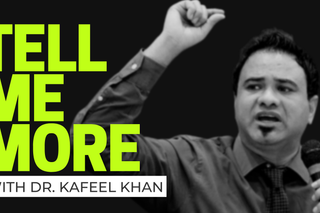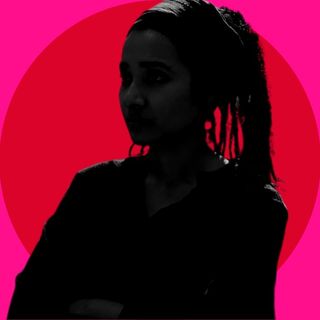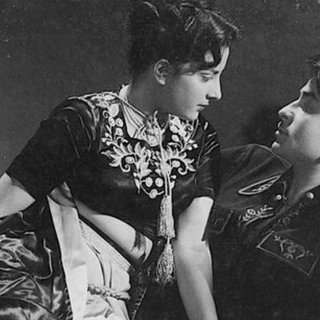
Tell Me More: Talking Social Responsibility and Incarceration During Covid19 With Dr. Kafeel Khan
“Covid19 isn’t the reason our healthcare system has collapsed; Covid19 has merely exposed our collapsed healthcare systems.”

In The Swaddle’s interview series Tell Me More, we discuss crucial cultural topics with people whose work pushes societal boundaries.
Dr. Kafeel Khan is a pediatrician. He was incarcerated after buying oxygen with his own money to save lives during the 2017 B.R.D. oxygen crisis in Gorakhpur, Uttar Pradesh. He now works with Doctors on Road, a collective of doctors and activists who bring healthcare information about Covid19 to India’s rural regions.
The Swaddle: You’ve lived through two crises involving oxygen — the 2017 Gorakhpur and India’s Covid19 second wave. What differences and similarities do you see in both crises?
Dr. Kafeel Khan: It was like a déjà vu situation for me. Whatever happened in those 54 hours in B.R.D. Medical College — I witness the same desperation and deaths all over India. BRD oxygen tragedy happened because the government didn’t pay the oxygen supplier to supply oxygen to the state-run hospital. This was a corruption issue, I think. This time, I think all of India is gasping for oxygen because the government has been caught napping. Our health minister started celebrating in December itself — the whole world had witnessed a second wave and India wasn’t prepared. But, the end result in both incidents is that people die — 63 children died in front of me because of lack of oxygen, and thousands have died from 20th April till 5th May in metro cities because of no oxygen. And this is metro cities, where the media is close enough to report it. But we don’t know what’s happening in the peripheries of India, where there’s no access to proper healthcare. Covid19 isn’t the reason our healthcare system has collapsed. Covid19 has merely exposed our collapsed healthcare systems.
TS: Lots of doctors in Uttar Pradesh speaking up about the Covid19 crisis in the state are being threatened with prison. What is the mental state of doctors working through this situation?
KK: The government is still in denial mode. Uttar Pradesh government is hell-bent on manipulating data — even the Allahabad High Court has categorically said that death because of shortage of oxygen is genocide. They’ve clearly said that count the number of people dying due to a lack of access to tests. The situation is grave in UP — the doctors, paramedical staff, nurses, ward boys, pharmacists — everyone is working hard continuously. Doctors simply don’t have resources. See, a doctor-patient relationship is one of the greatest bonds, according to me. When a patient dies in front of a doctor, the doctor feels incredibly sad — they may not show it, but they will cry from inside. I know it because that’s how I feel. So doctors who see their patients die because of shortages in oxygen, medicine, faulty ventilators — that’s another trauma. Recently, Dr. Vivek Rai died by suicide in Delhi because he was performing around 10 CPRs in a day — and most of them wouldn’t survive. He suffered from severe depression and died by suicide. The whole doctor fraternity has lost more than 1,000 doctors due to Covid19, and the whole promise of giving one crore rupees to corona warriors is nowhere to be. So many doctors saw their parents die because they gave them Covid19 due to their exposure at the hospital. Many of my seniors died in the ward. Many of my juniors worked through pregnancies and suffered complications while working. Without resources, doctors are forced into a tough and frustrating situation, which the government needs to look into.
TS: Do you think medicine should be a socially aware profession? Can doctors in India commit themselves to be socially aware, and if not, why?
KK: Every Indian citizen has a responsibility to protect their constitution. If anything is hurting the nation, you should speak up — doctor, engineer, whatever. That’s why I protested against the NRC-CAA because I felt it was bad for all of India. What we are witnessing in metros today — death and struggle — that is a frequent problem in so many states in India — U.P, Bihar, Chattishgarh, M.P, Jharkhand, Assam, and more. If someone undergoes an emergency, they have to travel 200-300 kilometers to get a doctor. By the time they reach and have found a bed, they’re dead. When the BRD oxygen tragedy happened — there were five children per warmer. One warmer is meant for one child.
Dealing with the bad side of politics when you speak up is inevitable because nobody likes you exposing the health system. Health, education and employment are basic issues hurting each Indian for the past 75 years. India spends only 1.25% of the GDP expenditure on healthcare, and this is not unique to the current government. A few years ago, I worked in Bihar during the floods and the chamki bukhar — I had a great relationship with Bihar CM Nitish Kumar then. But, when I started doing camps in Bihar, I spoke up about a lot of irregularities in the healthcare system there. So, this time when I tried to obtain permission for Covid19 again, they rejected my attempt to go work there. So they won’t like it if you speak up. But you have to speak up, because you also have family, and because you are a human being. You have a beating heart? You speak up. That is true nationalism.
There are several doctors doing a good job, but most don’t want to speak up because of the repercussions. Before the BRD oxygen tragedy, I was a doctor who went to the hospital and came home to my family. I didn’t care about whether the petrol was Rs. 80 or Rs. 90 — we’d just give our cards and move on. I never realized who was Yogi ji or Modi ji and why there is so much poison in the name of religion and caste. Nobody wants to disturb that. Now they have the example of Dr. Kafeel, right? If you speak up, the government will put you in a situation that will make you beg and break. Once upon a time, I’d think of which car I can take to work. Now all my cars are gone because I couldn’t afford the bank loans. I have no proper income because I’ve been suspended, and I can’t work elsewhere because my resignation hasn’t been accepted. Life will be tough — nobody wants that!
TS: You spent around 500 days in jail over two years. What was your condition as a political prisoner?
KK: They didn’t give me food for five days. I had to chew my clothes. I’d cry, scream, beg — urinating was like colic pain. They stripped me and beat me. The jailer used to come and tell me that I will only give you food after you stop talking about the BRD oxygen tragedy and the government.
I only received relief after court intervention. When I was in Mathura Jail, my wife wrote to the Allahabad High Court to ensure my safety. There was a DIG level inquiry, in which an officer came to check on me. I asked him why he was depriving me of food and subjecting me to torture — he knew that I was a doctor and that I’d done nothing wrong. He said that he knew, but we follow orders because if you don’t follow, we will be like you.
TS: You’d also written to the Supreme Court about decongesting prisons during Covid19 after your experience.
KK: During Covid19, I was jailed in a small barrack with 120-140 other people sharing the same toilet. It was congested, hot, food was awful, and there were thousands of mosquitoes and flies swarming the area. There are so many deaths in India during the second wave — we don’t know what’s happening in jails because the news isn’t coming out. So why not release those prisoners who aren’t involved in heinous crimes, who don’t have criminal records or those who are political prisoners — like the 70-80-year-old activists in jail due to Elgar Parishad? At the least, these people should get parole.
I did write to the courts asking for the decongestion of prisons, but the process of making this happen is very slow. Boards will be formed, meetings will be held, and then they will sell recommendations to the DIG of prisons, who will then send the same to the local prison authorities. From there, the SGM will come every day and see which prisoner they’ll release. I hardly know people who have got parole. The process is slow but necessary — people say Covid19 has peaked in the second wave but I don’t think so.
TS: You’ve also worked in Kerala during the Nipah virus outbreak. What was your experience with a different public health system down south?
KK: Kerala does have a better public health system. If you compare the infant mortality rate between Kerala and UP, the numbers are 6 and 60 respectively. But, what I’ve seen in Wayanad during the 2018 floods made me believe that marginalized communities — especially Dalit communities in Kerala have been ignored. There was a huge Dalit colony in the area, but not a single primary health center, or any health center, no drinking water facilities, no toilet facilities. Half of them had tuberculosis symptoms — half of them. So many had treatable diseases. Honestly, I had a very rosy picture of Kerala before seeing that. I spoke to some media people, who ended up misinterpreting my words. I told them about the severe TB cases in these regions due to malnutrition. I should’ve said tuberculosis because the headline later said that smoking and tobacco led to malnutrition in Dalit colonies. This was awful, because it blamed the people living in those colonies for their own plight — knowingly or unknowingly.
TS: You and your family have endured threats, attacks and other consequences because you did the right thing. What has kept you on this path through all that hardship?
KK: What I did in 2017 — It came from within. I just got the message and ran. I think it was because my parents taught me to be good, and my teachers in college taught me that the patient always comes first. That was the instant reaction. Now what I’m doing — speaking the truth and raising my voice against injustice. I’ve managed to keep going because of my parents, teachers, and all the love I’ve received from people. But, I realized that I can be penalized even though I’m from a well-off family. What happens to people who are poor, voiceless, and belonging to marginalized communities? I have a responsibility to speak up — the doctor has become an activist
Aditi Murti is a culture writer at The Swaddle. Previously, she worked as a freelance journalist focused on gender and cities. Find her on social media @aditimurti.
Related


The “Man‑Hating” Lesbian Trope Takes Us Further Away From Queer Representation
